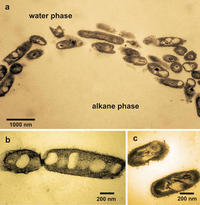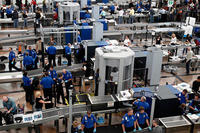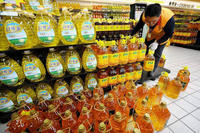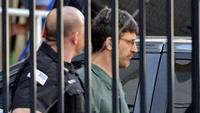-
Russia: Syria rebels used sarin gas
Vitaly Churkin, Russia’s UN ambassador, announced at a UN news conference Tuesday that scientific analysis by Russian labs of a suspected chemical weapons attack in Syria on 19 March concluded the attack probably had been carried out by rebels using sarin nerve gas of “cottage industry” quality. He said the gas was delivered by a crudely made missile.
-
-
Oil-devouring microbe communities a mile deep in the Gulf

The Deepwater Horizon explosion on 20 April 2010, caused the largest marine oil spill in history, with several million barrels of crude oil released into the Gulf of Mexico over the course of three months. Soon after the spill began, a massive oil slick was visible from orbiting satellites, yet once the underwater gusher was sealed, obvious traces of the crude oil disappeared much sooner than nearly all observers predicted. Some of the oil evaporated; some was skimmed off. Microbes “ate” much of the oil as well.
-
-
Study shows TSA security screeners are methodical, not slow

A study by Duke University, partially funded by DHS, found that TSA screeners may be slower than amateur screeners when it comes to performing visual searches, but the TSA screeners are better at detecting contraband.
-
-
Researchers highlight problem of legacy mercury in the environment

Researchers have published evidence that significant reductions in mercury emissions will be necessary just to stabilize current levels of the toxic element in the environment. So much mercury persists in surface reservoirs (soil, air, and water) from past pollution, going back thousands of years, that it will continue to persist in the ocean and accumulate in fish for decades to centuries, they report.
-
-
Highly portable X-ray imaging system developed
Los Alamos National Laboratory and Tribogenics have developed the MiniMAX (Miniature, Mobile, Agile, X-ray) camera to provide real-time inspection of sealed containers and facilities.MiniMAX is an alternative to the large, expensive, and fixed facilities presently required for security inspections using X-ray imaging. The complete MiniMAX portable radiography system weighs less than five pounds.
-
-
Chechen Islamic terrorists threaten February 2014 Winter Olympics in Sochi, Russia

Doku Umarov, a leading Chechen Islamic rebel, on Wednesday issued a call to Islamist militants throughout the North Caucasus to begin and plan for attacks to disrupt the February 2014 Winter Olympics which will be held in the Black Sea resort of Sochi. Security experts say that securing the games would be a daunting task.
-
-
Protecting drinking water systems from deliberate contamination

The importance of water and of water infrastructures to human health and to the running of the economy makes water systems likely targets for terrorism and CBRN (chemical, biological, and radionuclide) contamination. Reducing the vulnerability of drinking water systems to deliberate attacks is one of the major security challenges. An international project has developed a response program for rapidly restoring the use of drinking water networks following a deliberate contamination event.
-
-
Radiation dose passengers receive from airport scanners is low
An independent task force examining X-ray backscatter scanners at LAX airport determines that that people absorb less radiation from airport X-ray backscatter scanner than they do while standing in line waiting for the scan.
-
-
Rapid, on-site detection of illegal cooking oils

In recent years, illegal cooking oil incident in China caused serious food safety risks. Researchers have developed two rapid and convenient colorimetric detection methods of illegal cooking oils based on phase transfer technology.
-
-
Two men charged with planning an “X-ray weapon’’ to kill Muslim enemies of U.S., Israel

Two men from upstate New York were charged Wednesday with a scheme to build an X-ray weapon to kill Muslim enemies of the United States and Israel. They planned the weapon to kill the designated targets with lethal radiation, and some of the targets were to be killed in their sleep. The indictment says the two wanted to build a powerful X-ray device that could be placed in a truck and driven near a target. The driver would park, leave the area, and activate the device, “killing human targets silently and from a distance with lethal doses of radiation.”
-
-
U.K. nuclear disaster exercise reveals worrisome lapses in emergency response
Up to six times a year, U.K. nuclear weapons are transported in heavily guarded convoys between production facilities in Aldermaston and Burghfield in Berkshire, where the nuclear bombs are manufactured, and the Royal Naval Armaments Depot at Coulport on Loch Long in Argyll. The trips are required because scientists must regularly examine the 200 Trident missile warheads in order to make sure they are operationally reliable and properly maintained. Every three years, the U.K. Ministry of Defense (MoD) conducts a drill aiming to test how various agencies respond to an accident involving the convoy carrying the nuclear warheads. An internal report on the last drill notes many problems in the response to the simulated accident, including five-hour wait for weapons experts, confusion over radiation monitoring, and ambulance crews refusing to take contamination victims to hospitals.
-
-
New microfluidic chip useful in counterterrorism, water and food safety
A new process for making a three-dimensional microstructure that can be used in the analysis of cells could prove useful in counterterrorism measures and in water and food safety concerns. Researchers developed a new microfabrication technique to develop three-dimensional microfluidic devices in polymers. Microfluidics deals with the performance, control, and treatment of fluids that are constrained in some fashion.
-
-
Airport baggage scanning: slow, steady pace yields better results
Next time you are doing a slow burn in security screening at the airport, calm yourself with the assurance that a more deliberate baggage scanner may do a better job. Researchers find that systematic searching frees up memory to do a better job at scanning.
-
-
Detecting explosives, not toothpaste
Researchers want airports, border checkpoints, and others to detect homemade explosives made with hydrogen peroxide without nabbing people whose toothpaste happens to contain peroxide. This is part of the challenge faced in developing a portable sensor to detect a common homemade explosive called a FOx (fuel/oxidizer) mixture, made by mixing hydrogen peroxide with fuels.
-
-
U.S. confirms: Assad used chemical weapons against Syrian rebels, civilians
The Obama administration has informed Congress a few minutes ago that the U.S. intelligence community has determined that the Assad regime has used chemical weapons on several occasions against both rebel forces and Syrian civilians. The U.S. intelligence community says these attacks, each using small quantities of sarin gas, have killed about 150 Syrians.
-
More headlines
The long view
Keeping the Lights on with Nuclear Waste: Radiochemistry Transforms Nuclear Waste into Strategic Materials
How UNLV radiochemistry is pioneering the future of energy in the Southwest by salvaging strategic materials from nuclear dumps –and making it safe.
Model Predicts Long-Term Effects of Nuclear Waste on Underground Disposal Systems
The simulations matched results from an underground lab experiment in Switzerland, suggesting modeling could be used to validate the safety of nuclear disposal sites.
